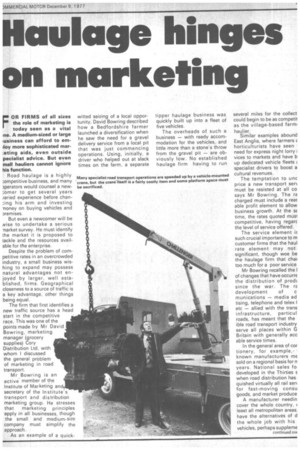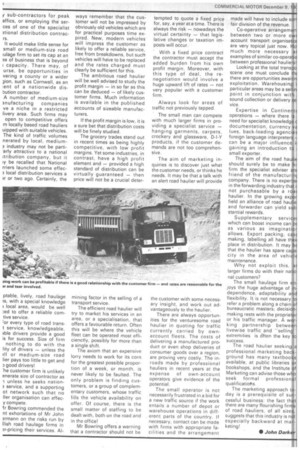Haulage hinges on marketing
Page 43

Page 44

If you've noticed an error in this article please click here to report it so we can fix it.
FOR FIRMS of all sizes the role of marketing is today seen as a vital ,ne. A medium-sized or large lusiness can afford to emiloy more sophisticated mar:eting aids, even outside pecialist advice. But even mall hauliers cannot ignore his function.
Road haulage is a highly 3ompetitive business, and many )perators would counsel a new.-,omer to get several years /aried experience before chan..,-ing his arm and investing -noney on buying vehicles and premises.
But even a newcomer will be wise to undertake a serious -narket survey. He must identify r he market it is proposed to tackle and the resources available for the enterprise.
Despite the problem of competitive rates in an overcrowded industry, a small business wishing to expand may possess natural advantages not enjoyed by larger, well established, firms. Geographical closeness to a source of traffic is a key advantage, other things being equal.
The firm that first identifies a new traffic source has a head start in the competitive race. This was one of the points made by Mr David Bowring, marketing manager (grocery supplies) Cory Distribution Ltd, with whom I discussed the general problem. of marketing in road transport.
Mr .Bowring is an active member of the Institute of Marketing and secretary of the In stitute's transport and distribution marketing group. He stresses that marketing principles apply in all businesses, though the small and medium-size company must simplify the approach.
As an example of a quick
witted seizing of a local opportunity, David Bowring described how a Bedfordshire farmer launched a diversification when he saw the need for a gravel delivery service from a local pit that was just commencing operations. Using, initially, a driver who helped out at slack times on the farm, a separate tipper haulage business was quickly built up into a fleet of five vehicles.
The overheads of such a business — with ready accommodation for the vehicles, and little more than a stone's throw from the gravel pit — are obviously low. No established haulage firm having to run several miles for the collect could begin to be as competit as the village-based farm' haulier.
Similar examples abound East Anglia, where farmers horticulturists have seen need for express night lorry : vices to markets and have b up dedicated vehicle fleets specialist drivers to boost a cultural revenues.
The temptation to unc price a new transport ser. must be resisted at all co says Mr Bowring. The ra charged must include a reas able profit element to allow business growth. At the se time, the rates quoted musi competitive, having regarc the level of service offered.
The service element is such crucial importance to m customer firms that the haul rate element may not significant, though woe be the haulage firm that char too much for a poor service Mr Bowring recalled the I of changes that have occurre the distribution of prodt since the war. The re development of munications — media ad tising, telephone and telex I etc — allied with the trans infrastructure, particul roads, has meant that the ible road transport industry serve all places within G Britain with generally ace able service times.
In the general area of cor tionery, for example,, known manufacturers ME sold on a regional basis for rf years. National sales fo developed in the Thirties s when road distribution has quished virtually all rail sen for fast-moving consu goods, and market produce
A manufacturer needin cover the whole country, ( least all metropolitan areas, have the alternatives of d the whole job with his vehicles, perhaps suppleme y sub-contractors for peak affics, or employing the serces of one of the specialist 3tional distribution contracrs.
It would make little sense for small or medium-size road iulage firm to set its cap at an aa of business that is beyond ; capacity. There may, of urse, be opportunities in vering a county or a wider lion, such as Cornwall, as an lent of a nationwide disaution contractor.
A number of medium-size
3 nufacturing companies ye a niche in a restricted livery area. Such firms may open to competitive offers m locally based road hauliers uipped with suitable vehicles. The kind of traffic volumes nerated by local, medium? industry may not be partiarly attractiva to a national ;tribution company, but it iy be recalled that National rriers launched some effeca local distribution services a 3r or two ago. Certainly, the ptable, lively, road haulage 3s, with a special knowledge 3 local area, would be well ed to offer a reliable corntive service.
'or every type of road transt service, knowledgeable, ible drivers provide a good is for success. Size of firm nothing to do with the lity of drivers — unless the ill or medium-size road lier pays too little to get and a good driversl be customer firm is unlikely enerate size of contractor as 1 unless he seeks nation?. service, and a supporting ot network such that no Iler organisation can effecy compete.
Bowring commended the nt exhortations of Mr John armann on the risks run by Ilish road haulage firms in ?r-pricing their services. Al ways remember that the customer will not be impressed by obviously old vehicles which are for practical purposes time expired. New, modern vehicles will impress the customer as likely to offer a reliable service, free from breakdowns, but such vehicles will have to be replaced and the rates charged must clearly be sufficient for this.
The ambitious road haulier will be well advised to study the profit margin — in so far as this can be deduced — of likely customer firms. Much information is available in the published accounts of sizeable manufacturers, If the profit margin is low, it is a sure bet that distribution costs will be finely studied.
The grocery trades stand out in recent times as being highly competitive, with low profit margins. Yet some industries, in contrast, have a high profit element and — provided a high standard of distribution can be virtually guaranteed — then price will not be a crucial deter mining factor in the selling of a transport service.
The efficient road haulier will try to market his services in an area, or a specialisation, that offers a favourable return. Often this will be where the vehicle fleet can be operated most efficienctly, possibly for more than a single shift.
The axiom that an expensive lorry needs to work for its corn for the greatest possible proportion of a week, or month, is never likely to be faulted. The only problem is finding customers, or a group of complementary customers, whose traffic fills the vehicle availability on offer. Of course, there is the small matter of staffing to be dealt with, both on the road and in the office!
Mr Bovvring offers a warning that a Contractor should not be tempted to quote a fixed price for, say, a year at a time. There is always the risk — nowadays the virtual certainty — that legislative changes or taxation imposts will occur.
With a fixed price contract the contractor must accept the added burden from his own profit margin. Moreover, with this type of deal, the renegotiation would involve a huge upward lift of rates — not very popular with a customer firm.
Always look for areas of traffic not previously tapped.
The small man can compete with much larger firms in providing a specialist service — hanging garments, carpets, crockery and glassware. D-I-Y products, if the customer demands are not too comprehensive.
The aim of marketing inquiries is to discover just what the customer needs, or thinks he needs. It may be that a talk with an alert road haulier will provide the customer with some necessary insight, and work out advantageously to the haulier.
There are always opportunities for the venturesome road haulier in quoting for traffic currently carried by ownaccount fleets. The costs of delivering a manufactured product or even shop deliveries of consumer goods over a region, are proving very costly. The inroads made by professional hauliers in recent years at the expense of own-account operators give evidence of the potential.
The small operator is not necessarily frustrated in a bid for a new traffic source if the work entails a number of depot or warehouse operations in different parts of the country. If necessary, contact can be made with firms with appropriate facilities and the arrangement made will have to include s r fair division of the revenue.
Co-operative arrangem between two or more o I account transport organise are very topical just now. much more necessary examples of similar co-oper between professional .haulie
Looking at the total trans scene one must conclude there are opportunities awai exploitation. Warehousin particular areas may be a sel point in conjunction wit sound collection or delivery vice.
Expertise in Contine operations — where there need for specialist knowledg documentation, currency lues, back-loading agenc foreign language interpreter can be a major influenc gaining an introduction t small exporter.
The aim of the road ha should surely be to make firm the specialist adviser friend of the manufactur company. There is no exper in the forwarding industry th not purchasable by a r haulier. In the growing ex field an alliance of road hau and forwarder can yield s stantial rewards.
Supplementary servi which can boost income can as various as imaginat allows. Export packing, c making, labelling all have t place in distribution. It may that the haulier has spare ca city in the area of vehi maintenance.
Why not exploit this, larger firms do with their na nal customers?
The small haulage firm joys the huge advantage of dependence, adaptability a ci flexibility. It is not necessary 13 refer a problem along a chain bureaucratic masters; decisi making rests with the proprie or his traffic manager. A w king partnership betwe livewise traffic and "sellin extremities is dften the key success.
The road haulier seekin professional marketing ba ground has many textboo available, at public libraries bookshops, and the Institute Marketing can advise those w seek formal profession qualificatiohs.
The marketing approach t day is a prerequisite of su cessful business: the fact th there are many flourishing fir of road hauliers, of all size suggests that this industry is n especially backward at ma keting!




































































































